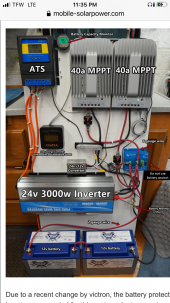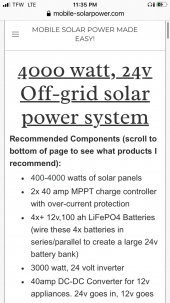Jamie.sanders
New Member
- Joined
- Dec 1, 2019
- Messages
- 159
New guy here, I’m looking at the diy blueprints, and the 3,000 watt system is almost exactly what I need but would like just a bit more power. I will be running eight 280ah batteries, and 2,000 watts of solar panels.
My question is if I follow this blueprint but changed the inverter to a 4,000 watt, instead of the 3,000 watt, would I have to make any other changes?
Thanks in advance, I’m still reading and learning.
My question is if I follow this blueprint but changed the inverter to a 4,000 watt, instead of the 3,000 watt, would I have to make any other changes?
Thanks in advance, I’m still reading and learning.




